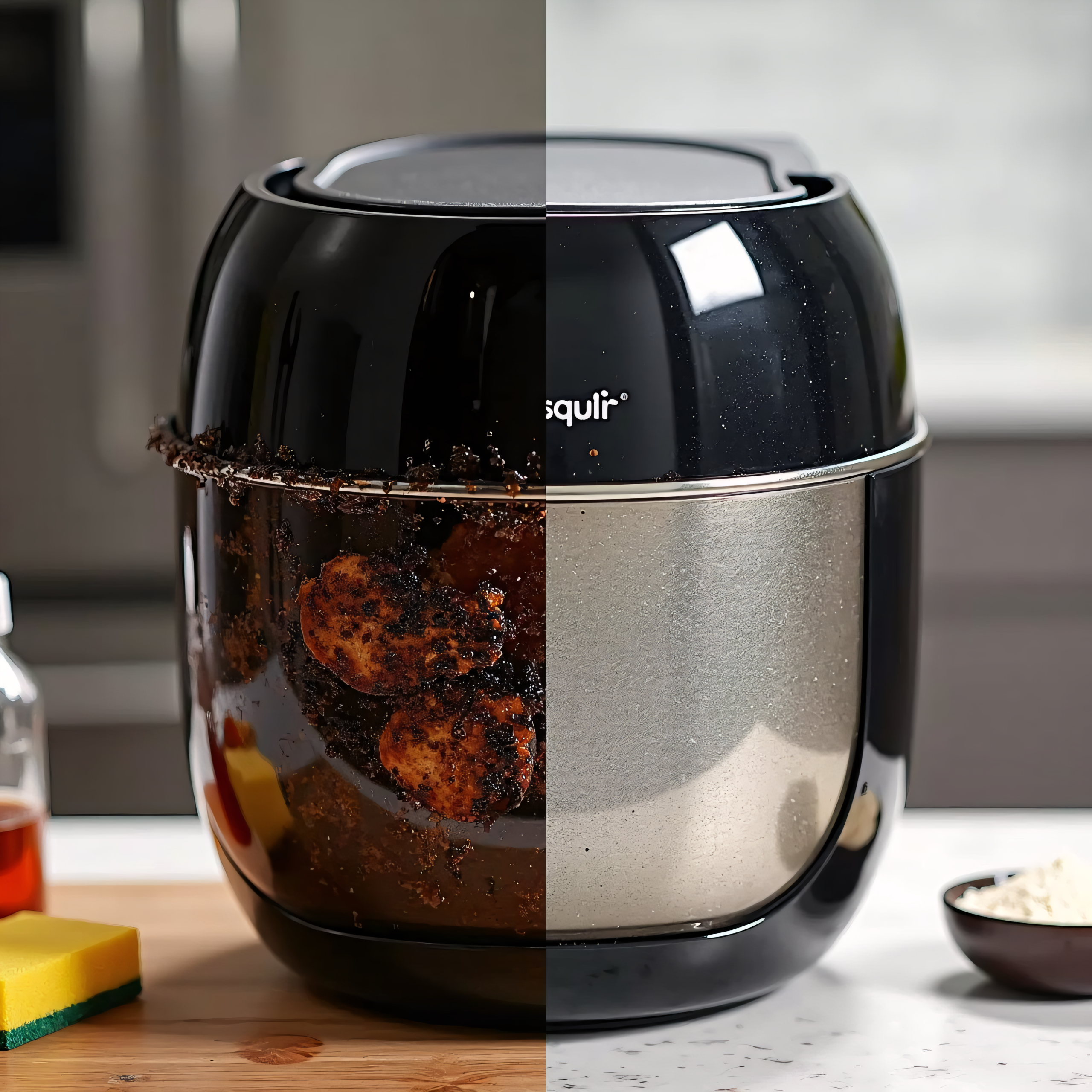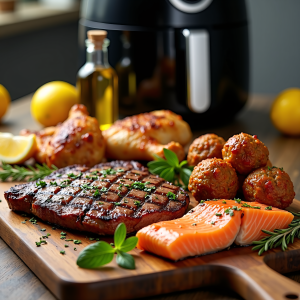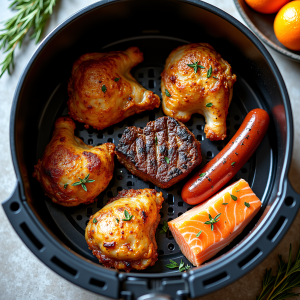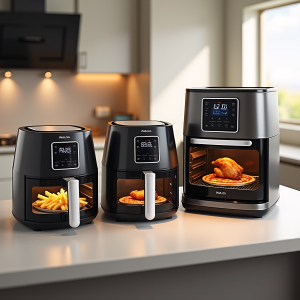reading time: approximately 10 minutes
Section 1: Why is My Air Fryer Not Heating?
A non-heating air fryer is a major inconvenience. Symptoms can include a cold basket, no visible heating element glow, or a failure to reach the set temperature. This typically indicates a problem with the power supply, heating element, thermostat, or control panel.
Possible Causes:
- Power Supply: The most common cause is a simple power issue. Ensure the air fryer is securely plugged into a working outlet. Check the circuit breaker; a tripped breaker can cut power to the outlet. Test the outlet with another appliance to rule out an outlet malfunction.
- Heating Element Failure: The heating element is the core component responsible for generating heat. A visual inspection (after unplugging the air fryer!) might reveal a broken or damaged element. However, always prioritize safety and unplug the appliance before any inspection. Heating elements typically have a lifespan of several years, but their longevity depends on usage and maintenance.
- Thermostat Issues: The thermostat regulates the temperature. A faulty thermostat may prevent the heating element from activating or maintain the correct temperature. This is a more complex issue requiring professional diagnosis and repair.
- Control Panel Malfunction: Problems with the control panel, such as a faulty button or a malfunctioning display, can prevent the air fryer from heating correctly. This often requires professional repair.
Troubleshooting Steps:
- Power cycle the unit: Unplug the air fryer, wait 30 seconds, and plug it back in.
- Test the outlet: Use another appliance to ensure the outlet is working correctly.
- Inspect the heating element (with extreme caution and after unplugging the device): Check for visible damage.
When to Call a Professional: If the problem persists after these steps, or if you are uncomfortable inspecting internal components, contact a qualified repair technician. Safety should always be your top priority.
Section 2: Smoke Signals: Why is My Air Fryer Smoking?
A small amount of smoke, especially when using high-fat foods or with a new air fryer, is sometimes normal. However, excessive or persistent smoke is a cause for concern.
Common Causes of Excessive Smoke:
- High-Fat Foods: Excess fat dripping onto the heating element can cause smoke. Try using leaner cuts of meat, reducing the amount of oil, or air frying in stages.
- Food Particles: Buildup of food particles in the bottom pan (crumb tray) can ignite and produce smoke. Regular cleaning is crucial.
- Incorrect Temperature: Setting the temperature too high for the type of food can lead to burning and smoking.
Preventative Measures & Solutions:
- Clean the crumb tray regularly.
- Consider using parchment paper liners, but be aware that they may restrict airflow in some models.
- Adding a small amount of water to the bottom of the pan may help prevent smoking in some cases, but always check the manufacturer’s instructions, as this may not be suitable for all models.
Safety Warnings: Never leave an air fryer unattended when it is smoking. Turn it off immediately and unplug it.
Section 3: Uneven Cooking: Achieving Golden Perfection
Unevenly cooked food is a common frustration. One side might be perfectly crispy while the other remains pale and undercooked. This is often due to overcrowding, improper food placement, or insufficient agitation.
Causes & Solutions:
- Overcrowding: Don’t overload the basket. Food needs space for hot air to circulate effectively. Cook in batches if necessary.
- Food Placement: Arrange food in a single layer, ensuring pieces aren’t touching. For smaller items like fries or nuggets, spread them out evenly.
- Lack of Agitation: Shake or flip the food halfway through the cooking process. This ensures even exposure to the hot air. Many air fryers have a reminder function to prompt you to shake the basket.
Section 4: Decoding Air Fryer Error Codes
Air fryer error codes are designed to help diagnose problems. However, they can be cryptic. Always consult your air fryer’s user manual for a complete list of codes and their meanings. Common codes include:
- E1/E2: Often indicates a temperature sensor issue.
- E3/E4: May signal a heating element malfunction.
- E5/E6: Could indicate a problem with the fan or motor.
If you can’t resolve the issue based on the manual, contact the manufacturer’s customer support.
Section 5: Martin Lewis Air Fryers & Energy Efficiency
*Martin Lewis air fryers* have become a hot topic due to their potential for energy savings. Martin Lewis consistently advocates for using smaller appliances like air fryers instead of conventional ovens when cooking for one or two people. He highlights that air fryers use significantly less energy than ovens, potentially saving you money on your electricity bill. While the exact savings vary depending on usage and energy prices, the principle remains the same: smaller appliance, smaller energy consumption. To help make the switch, explore a wide range of air fryer models available {add affiliate link}.
Section 6: Advanced Tips & Tricks for Optimal Performance
- Preheating: While not always necessary, preheating your air fryer for a few minutes can help ensure even cooking and crispier results.
- Oil Sprayer: Use an oil sprayer instead of pouring oil directly onto food for better control and less mess.
- Marinades: Marinating food before air frying adds flavor and helps keep it moist.
- Cleaning: Regularly clean your air fryer to prevent buildup and maintain optimal performance. Consider a cleaning brush designed specifically for air fryers {add affiliate link}.
Section 7: FAQs – Your Air Fryer Questions Answered
-
Q: Can I use oil in my air fryer, and what type is best?
While air fryers excel at reducing oil usage for healthier cooking, a light spray of oil (like avocado or olive oil) can enhance crispiness. Avoid aerosol cooking sprays, as they can damage the air fryer’s non-stick coating. Using minimal oil maintains the benefits of air frying while achieving desirable texture, helping you enjoy delicious, guilt-free meals with your new appliance. -
Q: What foods *shouldn’t* I air fry, and why?
Certain foods don’t perform well in an air fryer. Very wet batters or foods with high moisture content (like steamed vegetables) may become soggy rather than crispy. Whole chickens, unless cut into pieces, may cook unevenly. Stick to recipes designed for air fryers for best results, experimenting cautiously and adjusting cooking times to suit your specific air fryer model. -
Q: How do I know when my air fryer is done cooking, and is a timer enough?
While your air fryer’s timer is helpful, relying solely on it isn’t always accurate. For food safety and optimal texture, use a digital food thermometer to verify internal temperatures, especially for meat, poultry, and fish. This ensures thoroughly cooked, delicious results every time and avoids undercooking risks, maximizing the value of your energy-efficient air fryer. -
Q: Can I put aluminum foil or parchment paper in my air fryer, and is it safe?
Many air fryer manufacturers allow the use of perforated parchment paper liners to simplify cleaning, but always check your user manual first. Heavy-duty aluminum foil can be used, but ensure it doesn’t block airflow, potentially causing uneven cooking or damaging heating elements. Proper use of these accessories makes your air fryer even more convenient {add affiliate link}. -
Q: My air fryer smells unusual when I use it – is this normal?
A slight plastic smell is common during the first few uses of a new air fryer, as the protective coatings burn off. This should dissipate with subsequent use. However, persistent strong or burning smells indicate a potential issue – like food residue burning – and require immediate attention. Regularly cleaning your air fryer prevents these odors and ensures safe operation. -
Q: How can I maximize the energy savings of my air fryer, as highlighted by experts like Martin Lewis?
Compared to a conventional oven, air fryers use significantly less energy. Maximise savings by cooking smaller portions, avoiding preheating when unnecessary, and keeping the air fryer clean to ensure efficient heat circulation. Short cooking times and lower wattage contribute to reduced energy bills, making your air fryer a smart choice as energy prices rise. -
Q: What should I do if my air fryer displays an error code on the control panel?
Air fryer error codes indicate a specific problem. *Always* consult your user manual; it provides a list of codes and suggested solutions. Don’t attempt to fix the issue yourself if you’re unsure – contacting a qualified appliance repair technician is the safest option to prevent further damage or safety hazards and maintain the long-term functionality of your air fryer.
Conclusion
In conclusion, we’ve covered a lot of ground in tackling the world of air fryer troubleshooting and optimization. From diagnosing why your air fryer won’t heat – often a simple power issue, but potentially a failing heating element or thermostat – to understanding and mitigating smoking caused by high-fat foods or neglected crumb trays, you’re now equipped to handle common issues with confidence. Remember, regular cleaning and preventative measures are your best allies in maintaining peak performance. We also explored the importance of understanding error codes (refer to your manual!), and how to leverage advanced tips like proper food placement and shaking for even cooking. As highlighted throughout, the air fryer’s appeal isn’t just convenience; it’s also about potential cost savings, a point frequently emphasized by financial experts like Martin Lewis.
Ready to take your air frying game to the next level? Explore our curated selection of air fryer accessories – from silicone liners and baking pans to specialized racks – designed to enhance your cooking experience and simplify cleanup! {add affiliate link}. Or, if you’re interested in diving deeper into energy efficiency in the kitchen, check out our related posts on smart appliance usage and reducing food waste {add affiliate link to related blog posts}. Don’t let a frustrating air fryer experience spoil your meal – you’ve got the knowledge to troubleshoot, optimize, and enjoy delicious, cost-effective cooking!
Still battling air fryer frustrations? Don’t let a faulty appliance ruin your cost-effective cooking! We’ve shared solutions to the most common air fryer problems – from heating issues to smoky mishaps. Click here to browse our recommended air fryer accessories and replacement parts (affiliate link) to get your appliance back to peak performance and enjoy those energy savings Martin Lewis talks about! Plus, share your biggest air fryer headache in the comments below – let’s troubleshoot together!



